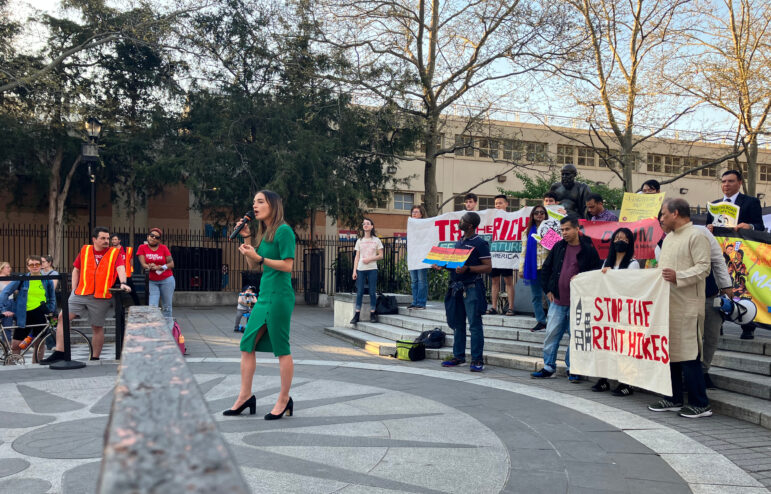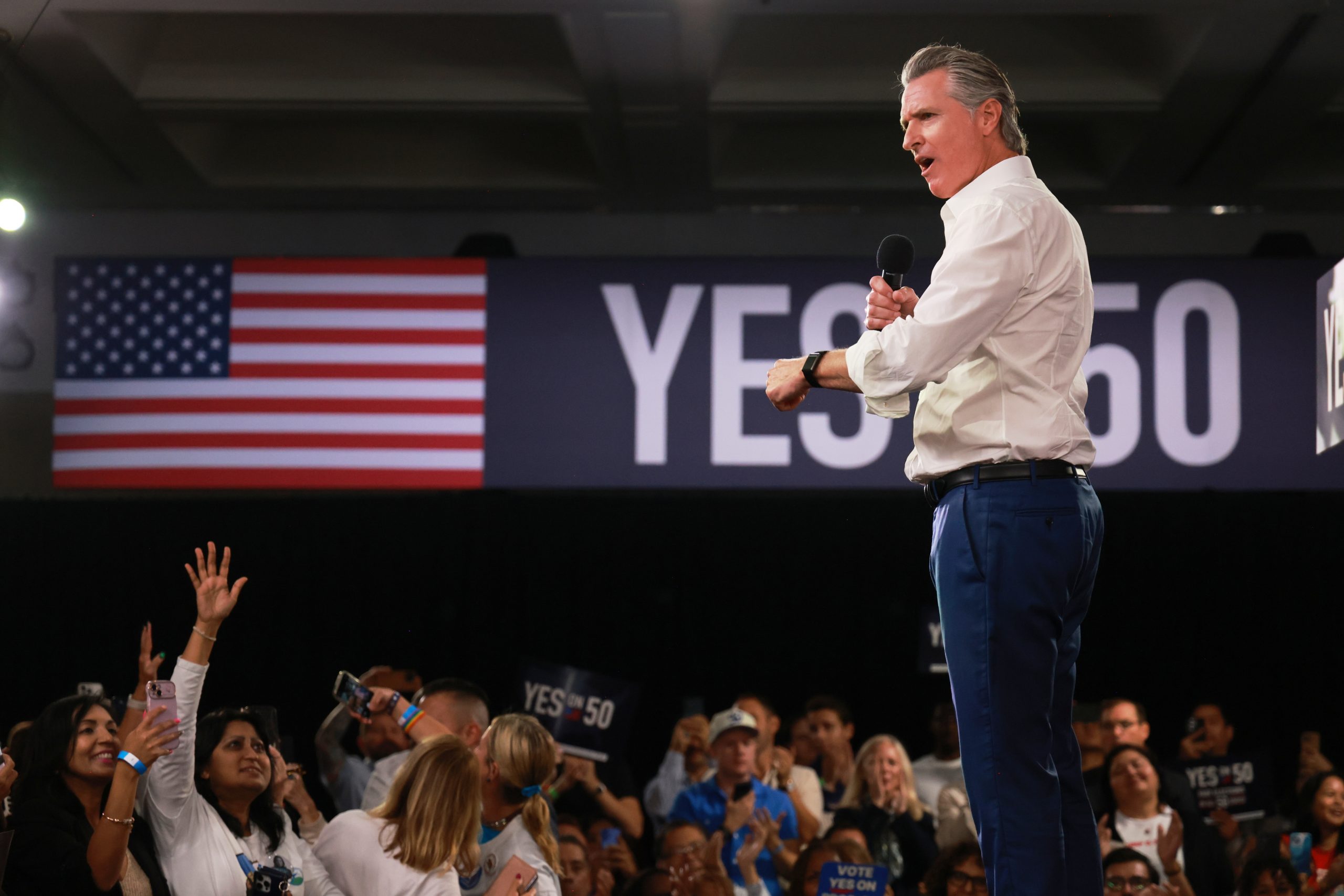Gov. Hochul’s plan to ramp up construction across the state has emerged as a sticking point in delayed budget talks—making now the time, some lawmakers say, to push for the deal to include renter protections like “good cause” eviction. “You try to resolve some thorny issues within a final budget if you can,” said Manhattan Assemblymember Linda Rosenthal.

Emma Whitford
Congresswoman Alexandria Ocasio Cortez speaking at a rally in Queens Wednesday night in support of the good cause bill.
Nearly two weeks after state lawmakers blew past their April 1 budget deadline, and as negotiations continue between legislative leaders behind closed doors, supporters of a bill that would expand eviction defenses statewide see a high-stakes moment.
Senate and Assembly budget responses released last month either named or alluded to good cause eviction legislation, which Gov. Kathy Hochul has consistently declined to take a position on. The proposal—which would prevent landlords from evicting tenants without a designated good cause, and allow tenants to challenge rent hikes above a certain level—has also been panned by real estate trade groups, who say it will discourage new development at a time when New York needs more housing.
Instead, the governor has focused on her Housing Compact proposal to double production in the state over the next decade, allowing developers to override local zoning if towns and cities refuse to either build or loosen their rules. Many lawmakers have balked, including in low-density Long Island and Eastern Queens.
“The bail and the housing have been dominant in our conversations thus far,” Senate Majority Leader Andrea Stewart Cousins told reporters in Albany Tuesday, referring also to Hochul’s push to give judges more discretion in setting bail.
Manhattan Assemblymember Linda Rosenthal, chair of her body’s housing committee, said now is the moment for good cause. “I think because everyone’s talking about these issues it’s the perfect place to put it at this time,” she said. “It’s a tactic used forever in the past—you try to resolve some thorny issues within a final budget if you can.”
Legislation sponsored by Brooklyn Sen. Julia Salazar and first introduced in 2019 would give tenants in all but the smallest, owner-occupied buildings recourse to fight eviction, so long as they’ve kept up with their rent and don’t cause nuisance.
It would also empower tenants to challenge rent increases above a certain level in court. Salazar’s bill as written sets the threshold at 3 percent in a year or 1.5 times the annual percentage change in the consumer price index, whichever is higher.
The good cause proposal was front and center at a rally Wednesday evening in Astoria, which drew Queens Democrats from all levels of government, including Congresswoman Alexandria Ocasio Cortez, who described it as essential.
“The more that the cost of rent and housing skyrockets, the more we’re going to see run-away levels of homelessness in the United States and in New York state specifically,” she said.
According to a Douglas Elliman report, median rents in Manhattan reached a new high of $4,175 in March, up 12.8 percent from the year prior. Brooklyn saw a year-over-year increase of 16.4 percent, to $3,493.
The current dynamic in Albany is familiar in some ways and unique in others. On one hand, state law and court precedent give governors substantial leverage in budget negotiations. Only the governor can issue a deadline extender, for example, which has happened twice already this year. The executive’s appropriation bills set the bounds on policy.
Yet Hochul is in her first term, and did not win her November election by a wide margin. Both the Senate and Assembly have Democratic supermajorities, increasing their leverage to push their own budget priorities.
“There is a difference when you win in a landslide and when you don’t,” said Blair Horner, executive director of the New York Public Interest Research Group. “I think the political power this governor has is not the same as her predecessor [Andrew Cuomo], because he won with large margins and could claim he was speaking for the people.”
Queens Sen. John Liu, a strong critic of Hochul’s Housing Compact, agreed. “The governor does have the upper hand but we have supermajorities in both chambers and so that changes the dynamic somewhat,” he said.
“A compact is an agreement, and this smacks more of edict than compact, and that’s what’s rubbing people the wrong way,” he added.
While the Senate and Assembly have more power outside of budget season, several lawmakers described a prevailing dynamic in Albany where entire policy areas are tackled at once. In this case, housing issues like zoning reform and good cause.
Queens Assemblymember Zohran Mamdani attended the rally in Astoria Wednesday. A strong proponent of good cause, he is more skeptical of Hochul’s Housing Compact, which he said would take years to bear fruit and lacks specific requirements to ensure that new housing will have affordable rents.
But he said the two are linked in negotiations, cuing up the need to push hard for good cause in the near term.
“They’re linked in that there is only going to be one conversation around housing, and if any aspect of things are addressed in the budget, we know they won’t be addressed afterwards. And if they’re not addressed in the budget, I’d be equally confident they won’t be addressed afterwards,” he said. “I think this is the moment right now.”
Other lawmakers described Hochul’s Housing Compact and the good cause proposal as complementary. Increasing housing production will help New Yorkers in the future and boost the economy, according to Manhattan Sen. Brad Hoylman-Sigal.
“I’m still hopeful that good cause is part of a grand bargain in housing in this year’s budget,” he said. “I’m hearing that it’s going to be tough but perhaps with the rally and well-known voices raising the alarm, it could still make it in.”
Sochie Nnaemeka, director of the New York Working Families Party, agreed that zoning reform and good cause can go hand-in-hand, calling for the “immediate fix of good cause and long-term plan of building more housing.”
But she expressed concern about the lack of strict affordability requirements in the Housing Compact, a necessity she said has “slipped away” from Hochul’s conversation.
Speaking to reporters earlier this month, Hochul stressed the flexibility within her plan, allowing localities to pursue the type of development they want for their communities.
“You decide if you want affordable, you decide if you want market rate, you decide if you want luxury,” the governor said. “Put it where you want. Just start rolling again.”
Hochul spokesperson Justin Henry did not comment on housing negotiations in a statement to City Limits, saying in part that the governor “continues to work with the legislature to deliver a final budget that meets the needs of all New Yorkers.”
For Shelly Nortz, deputy executive policy director for Coalition for the Homeless, there is concern that good cause legislation could be watered down in negotiations for a zoning plan that lacks funding to construct deeply affordable housing.
The governor’s proposal includes $250 million for infrastructure around new development, while the legislature has proposed $500 million. “The really most frustrating part of this whole discussion is nobody put big bucks on the table to build housing for extremely low-income people,” Nortz said.
She also cautioned against drawing too many conclusions about how negotiations will pan out. “I never say never in Albany,” Nortz said. “Just like there’s horse trading at the budget deadline, there’s horse trading at the end of session.”

Lawmakers acknowledged that if good cause legislation does break through, it won’t necessarily be identical to the bill that Sen. Salazar sponsors.
Salazar told City Limits that she would be opposed to any alterations that would carve out geographic areas of the state, or exempt landlords beyond those in the smallest, owner-occupied buildings—a demand from critics like Sen. Liu, who said that “small homeowners are lumped in with behemoth corporate landlords” under the bill.
But Salazar is open to raising the threshold for unreasonable rent increases. She cited California, where a similar law sets that threshold at either 5 percent plus the percent change in the cost of living in a year, or 10 percent—whichever is lower.
“I think the political reality means we may have to come up with something that would pass and would withstand any legal challenges,” she said.




